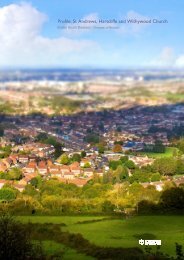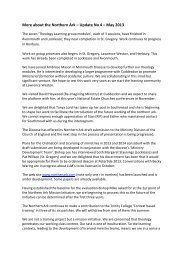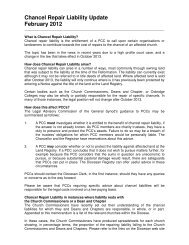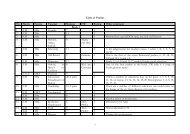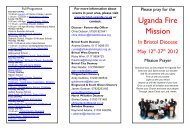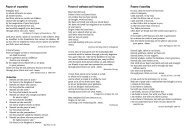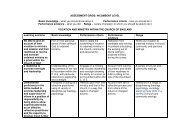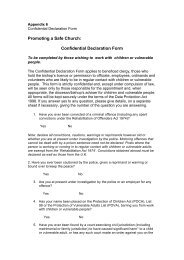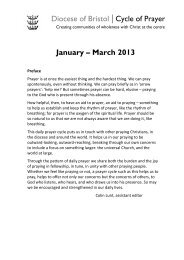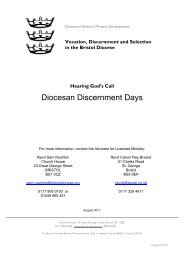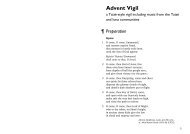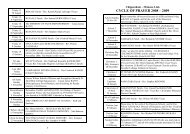A Wet and Windy Harvest for Puddles - Bristoldiocesecyp.org
A Wet and Windy Harvest for Puddles - Bristoldiocesecyp.org
A Wet and Windy Harvest for Puddles - Bristoldiocesecyp.org
Create successful ePaper yourself
Turn your PDF publications into a flip-book with our unique Google optimized e-Paper software.
A <strong>Wet</strong> <strong>and</strong> <strong>Windy</strong> <strong>Harvest</strong><br />
<strong>for</strong> <strong>Puddles</strong><br />
is the first in a series of books which<br />
introduce very young children to aspects of the Christian faith. They are designed to capture the<br />
interest <strong>and</strong> imagination of children through the adventures of <strong>Puddles</strong> – a very mischievous cat.<br />
In this first book, <strong>Puddles</strong> is enjoying playing in the autumn leaves<br />
but not content to play outside, she joins the congregation<br />
of the Reverend Freddie Fisher’s church <strong>for</strong> the <strong>Harvest</strong> service<br />
– <strong>and</strong> then the fun really begins…<br />
This book is a must to support topic work on <strong>Harvest</strong> celebrations<br />
in school or nursery settings.<br />
A beautiful soft toy <strong>Puddles</strong> / Pwllyn is also available to accompany the series<br />
<strong>and</strong> is ideal to become the class pet! She has also been known to accompany<br />
individual children <strong>and</strong> adults to the church on weekends <strong>and</strong> report back to the class on her<br />
adventures! A fantastic soft toy of the Reverend Freddie Fisher with four sets of vestments<br />
is irresistible. An ideal resource to support children’s play – they will love to dress him up!<br />
www.booksatpress.co.uk
Planning Support Sheets<br />
The following support sheets provide starting points <strong>and</strong> suggestions <strong>for</strong> a range of activities that can be explored<br />
in conjunction with the books <strong>and</strong> their accompanying resources.<br />
Teachers should select activities appropriate to the needs <strong>and</strong> abilities of the children. Teachers <strong>and</strong> pupils will<br />
naturally develop a range of other activities as they explore <strong>and</strong> enjoy the resources.<br />
The suggested activities have been cross-referenced to particular elements of the areas of learning from the Early<br />
Years Foundation Stage curriculum. In addition, links have been made to areas of religious education that are<br />
commonly featured in locally Agreed Syllabuses / Church Syllabuses.
Expressive Arts <strong>and</strong> Design<br />
Media <strong>and</strong> Materials<br />
Collect fallen leaves <strong>and</strong> twigs etc. <strong>and</strong> make an autumn<br />
display<br />
Paint leaf shapes<br />
Use leaves <strong>for</strong> printing with paint<br />
Make leaf rubbings using crayons<br />
Learn <strong>and</strong> sing songs about autumn <strong>and</strong> <strong>Harvest</strong><br />
Being imaginative<br />
Use imaginative play to recreate some elements of the story<br />
Make a church role-play area <strong>and</strong> act out the <strong>Harvest</strong><br />
service – include the characters <strong>Puddles</strong> <strong>and</strong> Freddie<br />
Dress Freddie in his clothes that he wears <strong>for</strong> the <strong>Harvest</strong><br />
service (green chasuble <strong>and</strong> stole)<br />
Religious Education<br />
Enjoy a range of stories <strong>and</strong> accounts from different<br />
faith traditions <strong>and</strong> cultures<br />
Hear the story A <strong>Wet</strong> <strong>and</strong> <strong>Windy</strong> <strong>Harvest</strong> <strong>for</strong> <strong>Puddles</strong><br />
Find out about what happens in places of worship in<br />
the local area <strong>and</strong> why people go to these places<br />
If feasible visit the local church to see it decorated <strong>for</strong><br />
<strong>Harvest</strong><br />
Talk to a Christian (lay person or clergy) about what<br />
<strong>Harvest</strong> means to them<br />
Make a church role-play area <strong>and</strong> act out the <strong>Harvest</strong> service<br />
– include the characters from the book <strong>Puddles</strong> <strong>and</strong> Freddie<br />
Develop curiosity <strong>and</strong> begin to ask questions about<br />
their own <strong>and</strong> other people’s home <strong>and</strong> community life<br />
Explore ways in which other religions celebrate harvest –<br />
e.g. Jewish Sukkot, Sikh Baisakhi,<br />
Explore how <strong>and</strong> why religious people in the local<br />
community help others through the work that they do<br />
Invite someone from a charity or The Salvation Army to<br />
talk about how they care <strong>for</strong> the less <strong>for</strong>tunate - support<br />
others with food parcels etc.<br />
Consider the rules <strong>and</strong> codes of conduct that they <strong>and</strong><br />
others follow which guide them in everyday life at<br />
home <strong>and</strong> school<br />
Look at a Christian Bible <strong>and</strong> talk about how it tells people<br />
that they should care <strong>for</strong> one another<br />
Cross-Curricular Topic Web based on the 2012 EYFS Framework<br />
plus Religious Education<br />
Personal, Social <strong>and</strong> Emotional<br />
Talk about how <strong>and</strong> why Christians say thank you to God<br />
<strong>for</strong> food / harvest<br />
Talk about how other people in class might show<br />
thankfulness/ appreciation <strong>for</strong> food <strong>and</strong> care <strong>for</strong> others (e.g.<br />
Jewish Sukkot, Muslim Eid-ul-Fitr)<br />
Explore how some people are kind to others by offering<br />
food <strong>and</strong> shelter (e.g. The Salvation Army)<br />
Think about what you say thank you <strong>for</strong> <strong>and</strong> to whom<br />
Think about how different people say thank you<br />
Consider the consequences of <strong>Puddles</strong>’ actions in the<br />
<strong>Harvest</strong> story<br />
Discuss – should <strong>Puddles</strong> climb up the pile of fruit <strong>and</strong><br />
vegetables <strong>and</strong> drink from the vase of water?<br />
Think about what is right <strong>and</strong> wrong or mischievous<br />
Context <strong>for</strong> Learning / Theme:<br />
A <strong>Wet</strong> <strong>and</strong> <strong>Windy</strong> <strong>Harvest</strong> <strong>for</strong><br />
<strong>Puddles</strong><br />
By Gill Vaisey<br />
Mathematical<br />
Sort autumn leaves by colour / shape /size<br />
Create a pictogram <strong>for</strong> leaves found in the school grounds<br />
or local park<br />
Make a graph / tally chart of how many children go to<br />
church, mosque, synagogue etc.<br />
Create a role-play shop to sell <strong>Harvest</strong> produce<br />
Count <strong>and</strong> sort fruits <strong>and</strong> vegetables<br />
Sort size of <strong>Harvest</strong> fruits <strong>and</strong> vegetables – smallest,<br />
biggest<br />
Communication <strong>and</strong> Language<br />
Hear the story A <strong>Wet</strong> <strong>and</strong> <strong>Windy</strong> <strong>Harvest</strong> <strong>for</strong> <strong>Puddles</strong><br />
Explore the meaning of new words to extend religious<br />
vocabulary– match words to pictures in the book.<br />
Recall the story to show an underst<strong>and</strong>ing of the main<br />
elements, such as main character, sequence of events.<br />
Learn the names of different fruits <strong>and</strong> vegetables – match<br />
names to pictures <strong>and</strong> real produce<br />
Literacy<br />
Read <strong>and</strong> write some words <strong>for</strong> the features of the church as<br />
mentioned in the story<br />
Physical<br />
Select from a collection of foods to show healthy choices<br />
ifferent fruits <strong>and</strong> vegetables – match names to pictures <strong>and</strong> real<br />
produce<br />
Underst<strong>and</strong>ing the World<br />
The World<br />
Explore the school’s grounds or local park to note seasonal<br />
changes / signs of autumn<br />
If possible, take the children outside on a windy day to have<br />
first-h<strong>and</strong> experience of leaves blowing in the wind.<br />
Collect autumn leaves <strong>and</strong> note colour, shape <strong>and</strong> textures<br />
Make an autumn display.<br />
Make an autumn vegetable soup<br />
Make a harvest loaf or mini rolls<br />
Grow seeds in pots e.g. mustard, cress, salad,<br />
People <strong>and</strong> Communities<br />
Explore ways in which religious communities celebrate<br />
harvest – e.g. Christian <strong>Harvest</strong>, Jewish Sukkot, Sikh Baisakhi,
Activity Suggestions <strong>for</strong> Early Years Foundation Stage<br />
focussing on People <strong>and</strong> Communities <strong>and</strong> Religious Education<br />
Possible General Themes: Festivals; Food; Autumn; Colours<br />
RE Theme: Special Places <strong>and</strong> Festivals Key Resource: A <strong>Wet</strong> And <strong>Windy</strong> <strong>Harvest</strong> For <strong>Puddles</strong><br />
RE Focus: Develop an awareness <strong>and</strong> enjoyment of church activities <strong>and</strong> the Christian <strong>Harvest</strong> festival.<br />
Activities relate to the book: A <strong>Wet</strong> And <strong>Windy</strong> <strong>Harvest</strong> For <strong>Puddles</strong>, by Gill Vaisey<br />
Suggested Activities RE <strong>and</strong> Early Learning Goals (2012)<br />
Collect autumn leaves with the children. Look at the colours, shapes <strong>and</strong><br />
textures.<br />
Provide opportunities <strong>for</strong> the children to be creative with paints <strong>and</strong><br />
crayons to produce their own leaves.<br />
Mathematics: Children use everyday language to talk about size, weight, to compare<br />
quantities <strong>and</strong> objects. They recognise, create <strong>and</strong> describe patterns. They explore<br />
characteristics of everyday objects <strong>and</strong> shapes <strong>and</strong> use mathematical language to<br />
describe them.<br />
Underst<strong>and</strong>ing The World: The world know about similarities <strong>and</strong> differences in<br />
relation to places, objects, materials <strong>and</strong> living things. They talk about the features of<br />
their own immediate environment <strong>and</strong> how environments might vary from one another.<br />
They make observations of animals <strong>and</strong> plants <strong>and</strong> explain why some things occur, <strong>and</strong><br />
talk about changes.<br />
Expressive arts <strong>and</strong> design: experiment with colour, design, texture, <strong>for</strong>m <strong>and</strong><br />
function.<br />
Make an autumn display. Expressive arts <strong>and</strong> design: experiment with colour, design, texture, <strong>for</strong>m <strong>and</strong><br />
function.<br />
If possible, take the children outside on a windy day to have first h<strong>and</strong><br />
experience of leaves blowing in the wind.<br />
Read the book A <strong>Wet</strong> And <strong>Windy</strong> <strong>Harvest</strong> For <strong>Puddles</strong>. Encourage the<br />
children to talk about the story <strong>and</strong> in particular the Reverend Freddie<br />
Fisher’s explanation of <strong>Harvest</strong>. Encourage the children to reflect on why<br />
it is important to share food with others less <strong>for</strong>tunate. Encourage the<br />
children to think about how Freddie responded to <strong>Puddles</strong> knocking down<br />
the fruit <strong>and</strong> vegetables <strong>and</strong> spilling the flowers (laughter rather than<br />
Underst<strong>and</strong>ing The World: The world explain why some things occur, <strong>and</strong> talk about<br />
changes.<br />
Communication <strong>and</strong> Language: listen to stories, accurately anticipating key events<br />
<strong>and</strong> respond to what they hear with relevant comments, questions or actions.<br />
Personal, Social <strong>and</strong> Emotional: They show sensitivity to others’ needs <strong>and</strong> feelings<br />
Underst<strong>and</strong>ing the World: People <strong>and</strong> Communities They know about similarities<br />
<strong>and</strong> differences between themselves <strong>and</strong> others, <strong>and</strong> among families, communities <strong>and</strong>
anger). traditions.<br />
RE: Explore similarities <strong>and</strong> differences in people’s festivals.<br />
Explore how <strong>and</strong> why people in the local community help others.<br />
Find out about what happens in places of worship <strong>and</strong> why people go to these places.<br />
If possible visit a church <strong>and</strong> explore the special features noted in the book.<br />
Encourage them to appreciate that some objects in the church are special<br />
<strong>and</strong> should be treated with respect.<br />
Create a church role-play area which includes some of the features<br />
mentioned in the story e.g. a ‘lectern’ <strong>for</strong> the Bible, a pulpit, a harvest<br />
display.<br />
Include the soft toy <strong>Puddles</strong> <strong>and</strong> the Reverend Freddie Fisher so that the<br />
children can re-enact the story.<br />
Underst<strong>and</strong>ing the World: People <strong>and</strong> Communities They know about similarities<br />
<strong>and</strong> differences between themselves <strong>and</strong> others, <strong>and</strong> among families, communities <strong>and</strong><br />
traditions.<br />
RE: Find out about what happens in places of worship <strong>and</strong> why people go to these<br />
places.<br />
Show curiosity <strong>and</strong> develop positive attitudes when learning about people from other<br />
religions <strong>and</strong> cultures.<br />
Explore <strong>and</strong> experiment with new learning opportunities.<br />
Expressive arts <strong>and</strong> design: They represent their own ideas, thoughts <strong>and</strong> feelings<br />
through design <strong>and</strong> technology, art, music, dance, role-play <strong>and</strong> stories.<br />
Learn <strong>and</strong> sing <strong>Harvest</strong> songs. Expressive arts <strong>and</strong> design: Sing songs, make music <strong>and</strong> dance.<br />
Make different types of bread that reflect different families <strong>and</strong> cultures.<br />
Share some food with each other.<br />
Encourage the children to say ‘please’ <strong>and</strong> ‘thank you’.<br />
www.booksatpress.co.uk<br />
Underst<strong>and</strong>ing the World: People <strong>and</strong> Communities They know about similarities<br />
<strong>and</strong> differences between themselves <strong>and</strong> others, <strong>and</strong> among families, communities <strong>and</strong><br />
traditions.<br />
Personal, Social <strong>and</strong> Emotional: They show sensitivity to others’ needs <strong>and</strong> feelings,<br />
<strong>and</strong> <strong>for</strong>m positive relationships with adults <strong>and</strong> other children.<br />
© Primary Religious Education Support Service GMV 4 / 2012



